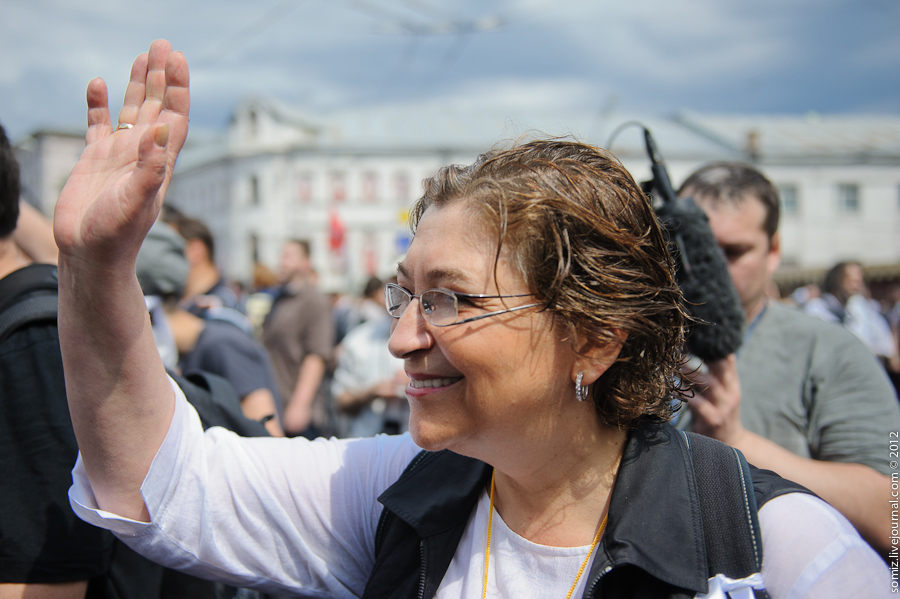Independent Russian journalist joins NYU Jordan Center
Journalist Yevgenia Albats, who was forced to flee Russia, has joined NYU’s Jordan Center for the Advanced Study of Russia and will teach courses in the spring.
Russian journalist Yevgenia Albats at a demonstration. (Courtesy of Evgeniy Isaev via Wikimedia Commons)
September 20, 2022
Independent Russian journalist Yevgenia Albats, who fled Moscow in August, has joined NYU’s Jordan Center for the Advanced Study of Russia as a distinguished journalist in residence this month. Albats will present seminars on Russian politics in the fall and teach journalism and political science courses in the spring.
Albats hosted a radio talk show on one of Russia’s last, independent radio stations until the beginning of Vladimir Putin’s war on Ukraine, when the government ordered that their website shut down. She later left the country after being fined by the government for alleged misinformation about the Russian invasion. Despite relocating, Albats continues to run The New Times, an independent Russian newspaper, from New York. Albats has previously taught at Harvard University and the University of Michigan, and holds a Ph.D. in political science.
“At a time when our community is most in need of high-quality information about the state of affairs in the country, Dr. Albats, a long-time, outspoken critic of the Putin regime, will no doubt be an invaluable source of insight, helping us understand what led to this moment, and what we need to know right now,” said Joshua Tucker, director of the Jordan Center and professor of Politics, Russian & Slavic Studies.
Russia designated Albats and several other media figures as foreign agents, a title which requires them to submit detailed financial reports and preface their publications with a disclaimer about their status. In March, following Russia’s invasion of Ukraine, lawmakers strengthened legislation that criminalizes the distribution of alleged fake news, thereby giving the government more authority to fine and arrest dissenting citizens. As of June, at least 50 people faced multi-year prison sentences or fines of up to $80,000 for spreading alleged misinformation about the military.
Due to the media censorship, journalists like Albats have started posting on social media platforms such as Telegram and YouTube to avoid excessive Russian oversight. Albats’ YouTube channel, where she continues to report for The New Times, has over 118,000 subscribers. For now, Russian citizens are still able to access these platforms, though experts warn this may not always be the case.
Leonid Peisakhin, an associate professor of politics at NYU Abu Dhabi, researches the effects of conflict on politics and media bias — specifically in Russia, Ukraine and Eastern Europe. Peisakhin said that the accessibility of social media platforms has allowed independent journalists to avoid government censorship, though they may have to adapt as Russian law evolves further.
“Like many of her colleagues in the journalism profession, [Albats] went into self-exile after the latest, and especially fierce, wave of government crackdowns against the few outposts of independent media in Russia,” Peisakhin said. “There is no official independent media left in Russia at this time. Should the Russian government start cracking down on YouTube access, we will have to see whether independent journalists like Albats will be able to adjust.”
The Jordan Center hosted the first of several programs called “Conversations with Yevgenia Albats” on Sept. 19, in which the journalist spoke with Maria Pevchikh. Pevchikh is the head of the investigation department at the Anti-Corruption Foundation — a nonprofit organization that was established by Alexei Navalny, a prominent opposition leader in Russia. The next event in the series will take place on Sept. 22 and is titled “Behind the New Iron Curtain.” The talk will center around Albats’ observations of the war in Ukraine that she gathered during her time in Russia.
Contact Isabella Tapia at [email protected].























































































































































